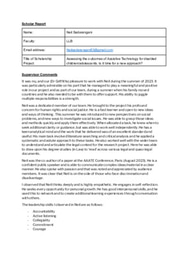Research Outline, Responsibilities and Community Impact
|
In 2022 The Global Alliance of Assistive Technology Organizations (GAATO) published a long-list of 39 Assistive Technology (AT) Outcome ‘Grand Challenges’. This research project is concerned with the measurement of assistive technology outcomes and impact at the individual level. It is also focused on addressing three of GAATO’s Grand Challenges:1)Developing adequate strategies to direct data collection for research or decision making. 2) Rethinking outcome measures to value both quantitative and qualitative data. 3) Redesigning outcome measures so that they capture stakeholder perspectives on the impact of AT on the life of an AT user in a holistic way, including quality of life, wellbeing, and health. Stage 1: will involve an assessment of existing approaches to outcome measurement, some of which strive to take into account what users deem to be important in relation to AT performance or their sense of what makes a good ‘fit’ for them in terms of AT selection. Stage 2: will involve a survey and focus groups with young disabled adults to explore their experiences as AT-use as a child/adolescent and of engaging in outcome/user-satisfaction assessment. The research will also seek their views on the adequacy of existing user-satisfaction measures and models and the outcomes that they judge to be most important. Stage 3: based upon the analysis of data from stage 2, new avenues will be proposed for the development of more authentically user-led assessment tools. Planned Research Impact (and how this will be measured) This is a pilot project designed to lay the foundations for a larger-scale research project, for which funding will be sought from a research council. The larger-scale project will be transdisciplinary, bringing together experts by experience (AT-users), designers, service providers and methodologists to develop, implement and evaluate a new model for outcome measurement vis-à-vis AT – one that is coproduced with disabled people who use AT and focuses on the outcome measures that they determine as being most important. The evaluation will involve testing the utility and suitability of the model in a selection of contexts, determining where it works, for whom, in which contexts and why. Learning from this evaluation will be used to refine the model. Impact: it is important to have a model that can be used to determine whether AT is meeting the needs of users. AT is known to be a rights-enabler – enhancing the inclusion and participation of disabled people. It can play an important role, in assemblage with other factors, in improving quality of life and ensuring dignity for disabled people. But only if it is well-designed and the right AT is provided to each person, and at the appropriate moment (amongst many other factors that impact upon outcomes and user-satisfaction). Measuring impact from this programme of research will involve monitoring the take up of any resulting new model, globally. Our teams responsibilities:
Assist with the preparation of a ‘work-in-progress’ conference paper to be delivered at the AAATE Conference, Paris, at the end of August 2023 |

Please sign in
If you are a registered user on Laidlaw Scholars Network, please sign in